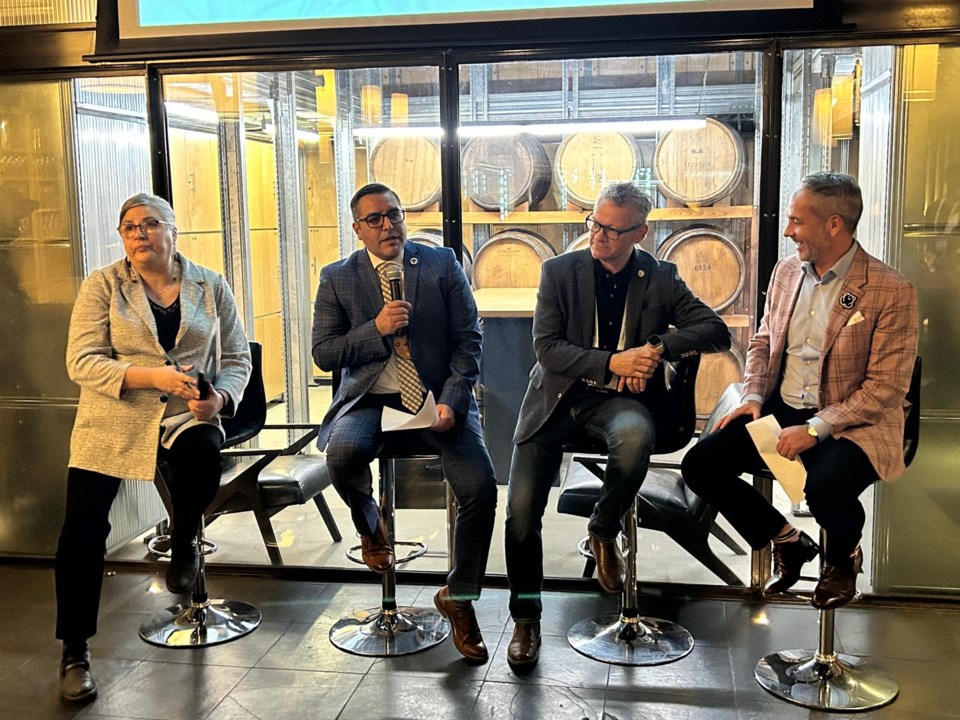First Nations leaders in Ontario — including one honoured this week by the mining industry — say they could hamstring projects in their territories if they don't start seeing meaningful consultation.
"Projects must move at the speed of trust," Temagami First Nation Chief Shelly Moore-Frappier said at a Chiefs of Ontario panel in Toronto on Tuesday evening. "And if you do not have that relationship with us, then we can make things difficult. But we can also make things move a lot quicker."
"You've got to shoot a monkey now and again so the rest of the monkeys behave," Wabun Tribal Council Executive Director Jason Batise told The Trillium afterward by way of explanation.
Leaders reiterated their call for a one-year moratorium on the province's online mining claims system, which since 2018 has allowed companies to stake claims via computer instead of hammering a post into the ground.
As a result, First Nations say they've been swamped with requests and can't keep up, and critical relationships with mining companies are suffering.
Anishinabek Nation Grand Council Chief Reg Niganobe said it's not uncommon to get 60 new claims a day. The 39 First Nations that make up the Anishinabek Nation have seen 164,036 claims since the new system launched — an increase of up to 30 per cent in some communities, he said.
"We just can't keep up with them," he said. "There has to be engagement and there has to be some sort of assistance to First Nations to help them address this issue."
Moore-Frappier said her community has one staff member to deal with 12,000 claims.
"What this new system does is it stops the relationship, and we need to build meaningful relationships with our proponents," she said.
Batise, who pioneered the "Wabun Model" of Indigenous mining partnerships, said his region is probably the busiest mining jurisdiction in the province, "if not Canada."
This week, at the Prospectors & Developers Association of Canada (PDAC) annual conference, the Wabun Tribal Council was awarded the Skookum Jim award for "exceptional achievement" in the Canadian mining industry.
For all his industry cred, Batise said he could obstruct projects through lengthy environmental assessments, if necessary.
"We can make that extremely painful," he said. "Of course, we want (projects) to be as clean and environmentally responsible as possible. But the regulatory environment does give us leverage to make projects move at the pace that we need them to."
If the government is going to accelerate mining, it has to beef up community participation, he said.
“You can’t do one without the other, Minister Pirie,” he said, referring to Ontario's minister of mines. "He's from our jurisdiction. He's from Timmins. I know the man. George, I implore you to come back to the table and talk to communities about how, if we're going to do a new way to do exploration — online maps, staking — to talk to the communities about it. This is not the way."
Batise said mining companies aren't the bad guys.
"Of all the industries, they're the ones that actually get it," he said. "I don't believe it was them that was asking for (online staking). I believe this was a government initiative."
Pirie's office didn't respond to a request for comment, but told CBC on Tuesday that a moratorium is not being considered.
NDP Leader Marit Stiles, who has been at PDAC this week, said the Ford government's "bulldozer approach" is putting projects in danger.
"As I've been told on multiple occasions by mining company representatives, they don't feel like the government is providing the predictability or the stability that their industry requires," she said.
The online staking system needs to change to comply with the United Nations Declaration on the Rights of Indigenous Peoples (UNDRIP), Green Leader Mike Schreiner said.
"I think the problem here is the government's failure to respect the principles of truth and reconciliation," Liberal MPP John Fraser said.
Batise said he sees a way for First Nations and industry to lobby the government together.
"If we can create those relationships with the Ontario Mining Association, the Ontario Prospectors Association, and convince them that, together, we go back to the government and say, 'This ain't working for nobody,'" he said. "'We've got to change something because you're just making my life miserable as a business, trying to get out there and engage with communities that don't want me there.'"
Batise said he hasn't yet started those conversations. The associations he named didn't respond to a request for comment from The Trillium, though Garry Clark, director of the Ontario Prospectors Association, told CBC that better maps could help save everyone time.
Ontario Regional Chief Glen Hare summarized the urgency of the situation.
“We've got nothing to lose," he said. "We've lost everything already. We've got everything to gain, chiefs."




